Press Release
ZF Aftermarket recommends: After the lockdown, think about road safety
- Winter road conditions cause damage and wear to many vehicle components
- Long downtimes during the lockdown have further intensified this effect
- Workshops should now offer their customers a springtime check in order to be able to detect damage at an early stage
- ZF Aftermarket supports businesses with a broad portfolio of spare parts in OE quality
This past winter was particularly hard for many vehicles. Not only was the weather especially harsh, but during lockdown many cars sat idle, exposing them to the destructive power of corrosion. Car workshops should therefore offer their customers a spring check to ensure that vehicles are roadworthy and restore confidence in road safety. ZF Aftermarket supports them with high-quality spare parts and know-how.

During the lockdown, many vehicles stood unused at the side of the road and were defenseless against the attacks of the winter road clearance service: snow ploughs pushed the snow under parked cars and into the wheel arches, gritters sprayed salt solution on chassis parts and brakes, and the extreme cold this winter drained the battery charge. Therefore, garages should encourage their customers to have a spring check, where, among other things, safety-relevant components such as the brakes, suspension parts and shock absorbers can be checked and replaced if necessary.
Long downtimes in bad weather allow chassis parts to corrode
Even a few days of rain are enough to coat brake discs with light rust film. This is completely harmless and disappears with the first hard braking. But if the moisture together with salt is allowed to impact on the parts for weeks, the corrosion penetrates deeper into the material. This can result in noises and vibrations when braking, but also rusting and corrosion of actuating elements.
Drivers should also be aware of the danger that small stones and particles of grit can cause. They can penetrate the narrow gap between the brake disc and the friction lining and get stuck. This results in scoring of the disc which can significantly reduce its service life.
In addition to the brakes, mechatronics engineers should also carry out a thorough visual inspection of the suspension parts, track rods and shock absorbers during the spring check. These parts are protected against corrosion during production, but grit acts like a sandblaster that can damage the coating and penetrating moisture and salt solution then do the rest. Road salt also makes rubber sleeves brittle and porous. If they lose their tightness, dirty water gets inside, washes out the grease filling and damages the joint.
The consequences of worn-out joints are reduced driving safety and poorer comfort. It is particularly expensive for the customer if moisture penetrates the steering gear through leaking steering boots. If the steering rack corrodes or the hydraulic seal fails, the complete replacement of the steering system is unavoidable.
Worn shock absorbers are hardly noticeable to the driver
In winter conditions, many car owners sensibly drive at slower speeds. This means that drivers are less likely to feel the effects of worn dampers - poor road holding, reduced cornering stability and longer braking distances. For this reason, car workshops should always include a damper check in their spring check, ideally with a professional shock absorber tester. Unevenly worn tyres or sawtooth formation on the tread also indicate worn vibration dampers.
Tip: What to do with vehicles with all-season tyres
ZF Aftermarket recommends not to combine the spring check exclusively with the seasonal tyre change, but to market it separately. Because with the rapidly increasing market share of all-season tyres, workshops would otherwise "forget" a significant proportion of their customers. And it should be noted that all-season tyres are not maintenance-free: good service advisors should inspect them for external damage and even wear, check their inflation pressure and, if necessary, suggest that the customer change the tyres by axle and balance them.
ZF Aftermarket has the right spare parts for all chassis repairs
If it is necessary to replace a component of the chassis and steering, experts recommend the installation of parts in OEM quality. With its brands Lemförder, Sachs and TRW, ZF Aftermarket covers the entire range of chassis parts required by automotive workshops. Lemförder stands for steering and chassis components, such as control arms, tie rods, wheel joints and rubber-to-metal parts. Under the Sachs brand, ZF Aftermarket sells vibration dampers for practically all vehicles on the market - from hydraulic monotube and twin-tube dampers to suspension struts and electronic damper systems. TRW caters for the product segments of brakes and steering. In the case of brakes, the range extends from friction linings to drums and discs to brake calipers. But complete steering systems can also be found under the TRW brand.
The ZF Aftermarket product portfolio includes transmissions and transmission parts, axles, steering systems and differentials, chassis and steering components, shock absorbers, disc brake systems, drum brakes and actuator systems, as well as steering and driveline components and rubber-to-metal parts.


